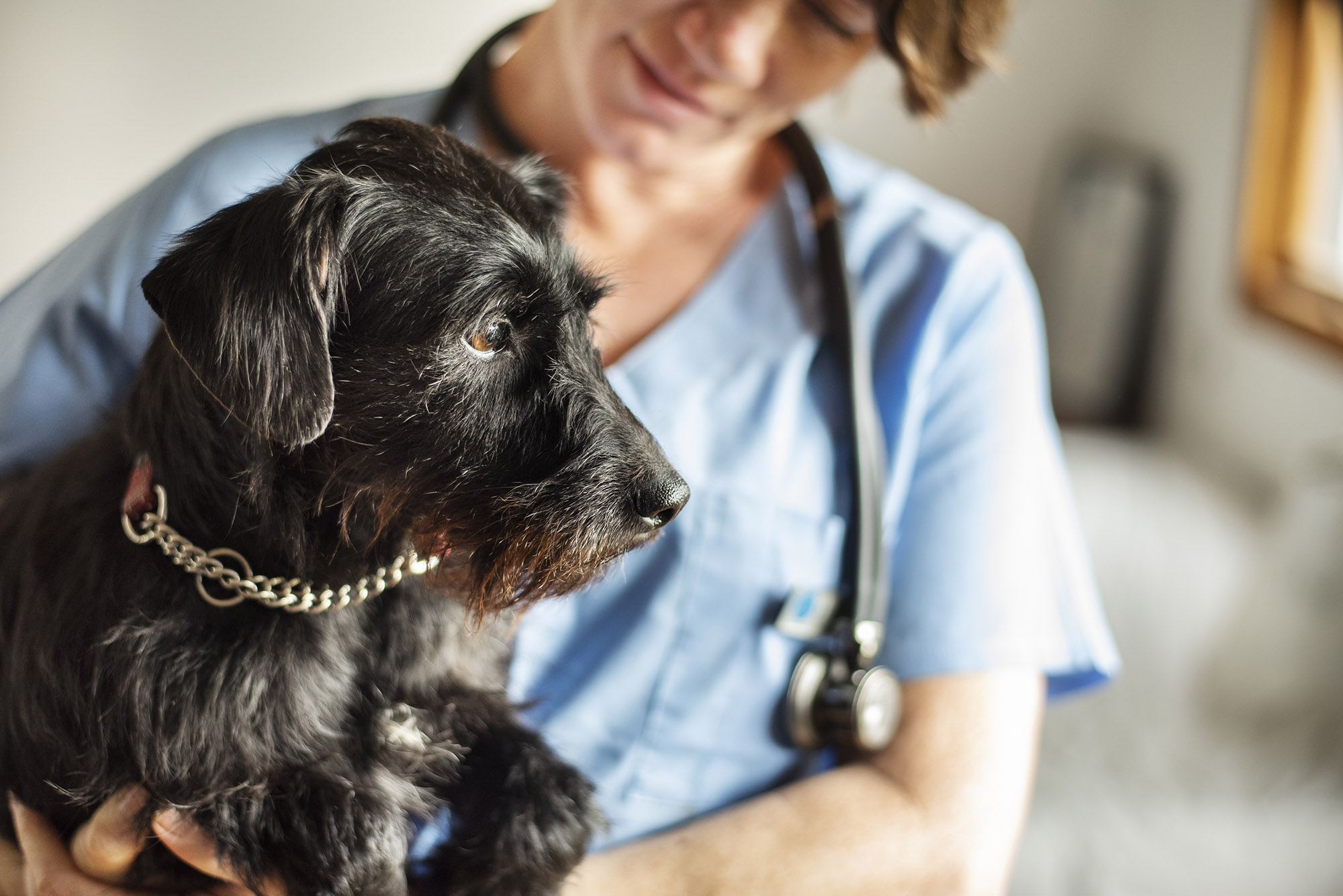Nearly Half of Dog Owners Are Hesitant to Vaccinate Their Pets
A new BU study is the first to quantify the prevalence of canine vaccine hesitancy, fueled by COVID-19 vaccine misinformation and mistrust

A survey of dog owners found nearly 40 percent believed canine vaccines are unsafe; the American Animal Hospital Association calls vaccinations “a cornerstone of canine preventive healthcare.” Photo by NickyLloyd/iStock
Nearly Half of Dog Owners Are Hesitant to Vaccinate Their Pets
A new BU study is the first to quantify the prevalence of canine vaccine hesitancy, fueled by COVID-19 vaccine misinformation and mistrust
Public confidence in adult and childhood vaccines has been on the decline—only made worse by COVID-19 vaccine misperceptions and mistrust. But now it appears that vaccine skepticism is extending to shots for pets too.
A new study published in the journal Vaccine found that US dog owners who harbor mistrust in the safety and efficacy of childhood and adult vaccines are also more likely to hold negative views about vaccinating their four-legged friends. The study, led by a Boston University School of Public Health researcher, analyzed a nationally representative sample of adults and found that more than half of people who own dogs expressed some level of hesitancy in inoculating their pets against rabies and other diseases.
According to the survey—conducted with 2,200 dog owners between March 30 and April 10, 2023—nearly 40 percent of respondents believed that canine vaccines are unsafe, more than 20 percent believed these vaccines are ineffective, and 30 percent considered them to be medically unnecessary. About 37 percent of dog owners also believed that canine vaccination could cause their dogs to develop autism, even though there is no scientific data that validates this risk for animals or humans. An estimated 45 percent of US households own a dog.
The study is the first to formally quantify the prevalence, origins, and health policy consequences of concerns about canine vaccination. Notably, the findings show indication of a COVID vaccine spillover effect in the US—that people who hold negative attitudes toward human vaccines are more likely to hold negative views toward vaccinating their pets. These dog owners are also more likely to oppose policies that encourage widespread rabies vaccination, and less likely to make the effort to vaccinate their pets.
“The vaccine spillover effects that we document in our research underscore the importance of restoring trust in human vaccine safety and efficacy,” says study lead author Matt Motta, an SPH assistant professor of health law, policy, and management, who studies how anti-science beliefs and attitudes affect health and health policies. “If non-vaccination were to become more common, our pets, vets, and even our friends and family risk coming into contact with vaccine-preventable diseases.”
Dog Vaccinations Are ‘Overwhelmingly Safe’
These attitudes are in contrast to state-level policies in the US, where almost all states require domestic dogs to be vaccinated against rabies. The disease still poses a potential health threat; more than 59,000 people die from canine-mediated rabies across the globe each year.
The risk is especially high for veterinarians and clinical staff.
“When a staff member is bitten by an animal, there is always concern for infection or trauma, but the seriousness of the situation escalates if the animal is unvaccinated or overdue for its rabies vaccine,” says Gabriella Motta, study coauthor and veterinarian at Glenolden Veterinary Hospital in Glenolden, Pa., and sister of Matt Motta. She says she encounters an unvaccinated animal or a vaccine-hesitant pet owner every day in her job.
In Pennsylvania, once a veterinary staff member is bitten by an undervaccinated or unvaccinated animal, the animal must undergo a period of observation and the staff member is encouraged to receive immediate medical attention. These situations place a mental health burden on staff, Gabriella Motta says, in an industry that already struggles with widespread burnout, understaffing, and job turnover.
The American Animal Hospital Association calls vaccinations “a cornerstone of canine preventive healthcare” and recommends that all dogs (barring specific medical reasons), receive a core set of vaccines for rabies, distemper, adenovirus, parvovirus, and parainfluenza, and advises that many dogs receive additional non-core vaccinations for Lyme disease, Bordetella (which causes kennel cough), and other diseases.
Gabriella Motta reiterates that the rabies vaccine is overwhelmingly safe and effective.
“With any drug, treatment, or vaccine, there is always a risk of adverse effects, but the risk with the rabies vaccine is quite low—especially when compared to the risk of rabies infection, which is almost 100 percent lethal,” she says. Pet owners who are concerned about the cost of pet vaccines may be able to seek low-cost options at local veterinary vaccination clinics, she adds.
The researchers, including Dominik Stecula, an assistant professor of political science in the College of Liberal Arts at Colorado State University, don’t believe canine vaccine hesitancy is widespread enough to pose a current threat to public health in the US—but that could change.“It’s important to remember that it once seemed unthinkable that MMR [measles, mumps, and rubella] vaccine mandates in public schools might come under attack in state legislatures across the country,” Matt Motta says. “And, yet, previous and ongoing research suggests that this is, indeed, the case.”
Comments & Discussion
Boston University moderates comments to facilitate an informed, substantive, civil conversation. Abusive, profane, self-promotional, misleading, incoherent or off-topic comments will be rejected. Moderators are staffed during regular business hours (EST) and can only accept comments written in English. Statistics or facts must include a citation or a link to the citation.